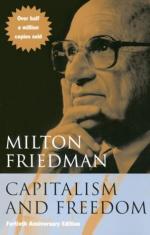
|
| Name: _________________________ | Period: ___________________ |
This test consists of 15 multiple choice questions and 5 short answer questions.
Multiple Choice Questions
1. What does Friedman say can government not duplicate?
(a) The creativity of the individual.
(b) An international monitoring system.
(c) The power of local control.
(d) The free market economic system.
2. Which of the following cannot be justified by Friedman for government interventions?
(a) Free speech.
(b) Roads.
(c) Public parks.
(d) Vouchers for education.
3. Which of the following can be justified by Friedman for government interventions?
(a) Subsidizing farm production.
(b) The draft.
(c) Minimum wage.
(d) Property rights.
4. What does Friedman assert is an example of an appropriate task for government?
(a) Providing for the social welfare.
(b) Regulating the job market.
(c) Determining price.
(d) Defining property rights.
5. How are decisions, for Friedman, made where unanimity is a costly way of making decisions?
(a) Executive decision.
(b) A system of checks and balances.
(c) Majority rule.
(d) Decisions by committee.
6. Friedman believes that all of the following are appropriate for fiscal policy except ______.
(a) Fluctuating in spending based on the political climate.
(b) Planning for stable tax rates.
(c) Avoiding erratic changes in spending.
(d) Spending based on community priorities.
7. Friedman believes that free markets are not sufficient for political freedom since many countries demonstrate the possibility of ______.
(a) Dictatorial government.
(b) Laissez-faire markets.
(c) Economic freedom.
(d) Authoritarian capitalism.
8. Friedman asserts that the Federal Reserve created the major contractions of the following years except______.
(a) 1926-27.
(b) 1937-38.
(c) 1929-33.
(d) 1920-21.
9. One question Friedman asks is how we can stop government from destroying ______.
(a) Citizens.
(b) Freedom.
(c) Taxes.
(d) Entertainment.
10. In Friedman's time, what was illegal to buy or sell?
(a) Silver.
(b) Gold.
(c) Ethanol.
(d) Alcohol.
11. In the market described by Friedman, exchanges between households are ______.
(a) Coerced.
(b) Voluntary.
(c) Unwilling.
(d) Obligatory.
12. Friedman makes the distinction between education and ______.
(a) Schooling.
(b) Aging.
(c) Income.
(d) Instruction.
13. According to Friedman, what is liberty's greatest enemy?
(a) The Federal government.
(b) The educational system.
(c) Concentration of power.
(d) Elected leaders.
14. What does Friedman claim that governments abuse?
(a) The trust of the people.
(b) Commodity standards.
(c) Ability to issue stocks.
(d) The power to determine taxes.
15. Friedman's theory is that monetary exchange rates will allow trades across countries to ______ in accord with those rates.
(a) Stagnate.
(b) Decrease.
(c) Increase.
(d) Equilibrate.
Short Answer Questions
1. What is one way Friedman believes some people criticize markets?
2. What does Friedman believe will become self-regulating?
3. What major event does Friedman strongly believe was a result of the government mishandling the money supply?
4. What does Friedman believe will markets do over time to monopolies?
5. One role of government argued by the New Deal was to ______.
|
This section contains 448 words (approx. 2 pages at 300 words per page) |

|




